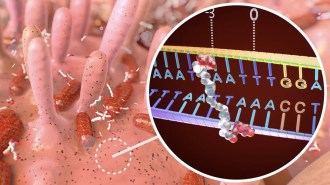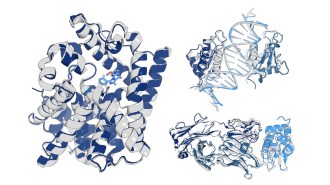Monogamy is not for the faint of heart, at least if you’re a protein.

Scientists examining the convoluted network of a cell’s metabolic reactions find that loyal proteins — those that stick to one main task — have important, high-stress jobs. Their promiscuous counterparts, which dabble in various chemical reactions, carry out tasks less crucial to life.
The new work, published in the Aug. 31 Science, examined the activity of enzymes — the proteins that make chemical reactions happen — in the bacterium E. coli. Researchers at the University of California, San Diego and Harvard Medical School used a computer model to analyze the various reactions that allow the bacterium to go about its business.
Of the 1,081 enzymes studied, 404 were generalists that carried out multiple chemical reactions. The 677 specialist enzymes, it turned out, were essential for the bacterium’s survival, for example tasked with turning genetic instructions into proteins.
Revealing where the generalists and specialists do their stuff in a metabolic network could help scientists identify starter enzymes for designing new drugs, fuels and other chemical products. It also may help biologists create organisms from scratch, says Pablo Carbonell, a synthetic biologist at the University of Évry-Val-d’Essonne in France.
The work clears up a long-standing question about promiscuity and monogamy among enzymes. Enzymes act on what scientists call substrates; for example amylase, an enzyme in saliva, breaks down the substrate starch. For more than 100 years enzymes have been presented as exceedingly loyal to their substrates. But the growing number of promiscuous enzymes that interact with multiple substrates and carry out multiple reactions have forced scientists to face the fact that all enzymes aren’t the dedicated, loyal players they’ve been made out to be.
In the 1970s, microbiologist Roy Jensen put forward the idea that in the early days of life almost all enzymes were promiscuous, carrying out several tasks, albeit not as efficiently as today’s specialists. This multitasking would allow a primitive cell with a small repertoire of proteins to still get things done. But why these promiscuous enzymes persist today has remained a puzzle.
The network approach allowed the researchers to examine where monogamy and promiscuity matter. “In a way it’s like looking at a traffic pattern in a city,” says team member Bernhard Palsson of UCSD. Palsson and his colleagues looked for points in E. coli’s metabolic network that have to work for the whole system to function. “We know in a city that there are critical streets, intersections or bridges where if stuff goes wrong things come grinding to a halt,” Palsson says.
In addition to catalyzing reactions essential for life, the monogamous enzymes tended to work at very active major thoroughfares in the network. So enzymes that deal with glycolysis, the almost constant process of turning food into energy, are highly specialized, loyal and dedicated to their tasks. On the other hand, an enzyme that deals with making vitamin B12, which cells don’t need much of, can afford to be a promiscuous jack-of-all trade type.
Promiscuity does not equal unimportant, though. Enzymes tasked with recognizing and breaking down toxic substances serve the cell better if they can recognize and deal with more than one kind of danger.






